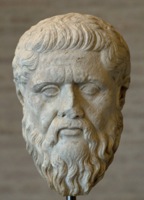Plato
Plato, Greek: Πλάτων, 428/427 or 424/423 BC[a] – 348/347 BC) was a philosopher, as well as mathematician, in Classical Greece and an influential figure in philosophy, central in Western philosophy. He was Socrates' student, and founded the Academy in Athens, the first institution of higher learning in the Western world. Along with Socrates and his most-famous student, Aristotle, Plato helped to lay the foundations of Western philosophy and science. Alfred North Whitehead once noted: "the safest general characterization of the European philosophical tradition is that it consists of a series of footnotes to Plato."
Plato's philosophical ability is evident in his Socratic dialogues; thirty-six dialogues and thirteen letters have been ascribed to him, although 15–18 of are contested. Plato's dialogues have been used to teach a range of subjects, including philosophy, logic, ethics, rhetoric, religion and mathematics. His other notable and influential work is the Theory of Forms which began a unique perspective on abstract objects, and lead to a school of thought called Platonism. Plato's writings have been published in several fashions; this has led to several conventions regarding the naming and referencing of Plato's texts.
The precise relationship between Plato and Socrates remains an area of contention among scholars. Plato makes it clear in his Apology of Socrates, that he was a devoted young follower of Socrates. In that dialogue, Socrates is presented as mentioning Plato by name as one of those youths close enough to him to have been corrupted, if he were in fact guilty of corrupting the youth, and questioning why their fathers and brothers did not step forward to testify against him if he was indeed guilty of such a crime (33d-34a). Later, Plato is mentioned along with Crito, Critobolus, and Apollodorus as offering to pay a fine of 30 minas on Socrates' behalf, in lieu of the death penalty proposed by Meletus (38b). In the Phaedo, the title character lists those who were in attendance at the prison on Socrates' last day, explaining Plato's absence by saying, "Plato was ill." (Phaedo 59b)
Plato never speaks in his own voice in his dialogues. In the Second Letter, it says, "no writing of Plato exists or ever will exist, but those now said to be his are those of a Socrates become beautiful and new" (341c); if the Letter is Plato's, the final qualification seems to call into question the dialogues' historical fidelity. In any case, Xenophon and Aristophanes seem to present a somewhat different portrait of Socrates from the one Plato paints. Some have called attention to the problem of taking Plato's Socrates to be his mouthpiece, given Socrates' reputation for irony and the dramatic nature of the dialogue form.
Aristotle attributes a different doctrine with respect to the ideas to Plato and Socrates (Metaphysics 987b1–11). Putting it in a nutshell, Aristotle merely suggests that Socrates' idea of forms can be discovered through investigation of the natural world, unlike Plato's Forms that exist beyond and outside the ordinary range of human understanding.[1]
